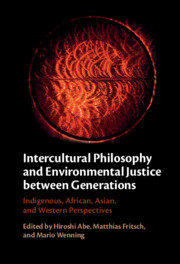 Intercultural Philosophy and Environmental Justice between Generations
Intercultural Philosophy and Environmental Justice between Generations Book contents
- Intercultural Philosophy and Environmental Justice between Generations
- Intercultural Philosophy and Environmental Justice between Generations
- Copyright page
- Contents
- Contributors
- Acknowledgments
- Introduction
- Part I Indigenous Philosophies on Justice between Generations
- Part II Intergenerational Ethics in Dialogue with Confucianism and Daoism
- 5 Ghosts and Intergenerational Justice
- 6 Intergenerational Ethics and Sustainability
- 7 Moral Motivation for Future Generations, Naturally
- 8 Transience, Responsible Transformation, and Deep Time in Daoist Thought
- Part III Humanity Facing the Near Environmental Future
- Index
- References
6 - Intergenerational Ethics and Sustainability
A Confucian Relational Perspective
from Part II - Intergenerational Ethics in Dialogue with Confucianism and Daoism
Published online by Cambridge University Press: 14 March 2024
- Intercultural Philosophy and Environmental Justice between Generations
- Intercultural Philosophy and Environmental Justice between Generations
- Copyright page
- Contents
- Contributors
- Acknowledgments
- Introduction
- Part I Indigenous Philosophies on Justice between Generations
- Part II Intergenerational Ethics in Dialogue with Confucianism and Daoism
- 5 Ghosts and Intergenerational Justice
- 6 Intergenerational Ethics and Sustainability
- 7 Moral Motivation for Future Generations, Naturally
- 8 Transience, Responsible Transformation, and Deep Time in Daoist Thought
- Part III Humanity Facing the Near Environmental Future
- Index
- References
Summary
This chapter argues that certain conventional discourses of sustainability, along with related frameworks for intergenerational ethics, create conceptual barriers to realizing the goals of genuine sustainability and intergenerational flourishing. Early Confucianism provides a model of intergenerational ethics that may better align with these goals. In particular, early Confucianism offers a relationally grounded ethics that conceptualizes community diachronically and emphasizes the importance of building and sustaining harmonious, flourishing human communities over time. These Confucian ideas resonate with relational and communitarian approaches to intergenerational ethics and sustainability, which can helpfully supplement existing frameworks for intergenerational ethics by emphasizing shared values and concerns, including commitments to common intergenerational projects.
- Type
- Chapter
- Information
- Intercultural Philosophy and Environmental Justice between GenerationsIndigenous, African, Asian, and Western Perspectives, pp. 115 - 130Publisher: Cambridge University PressPrint publication year: 2024
References
- 1
- Cited by
